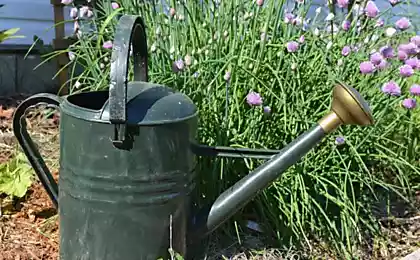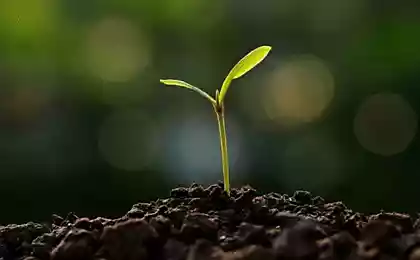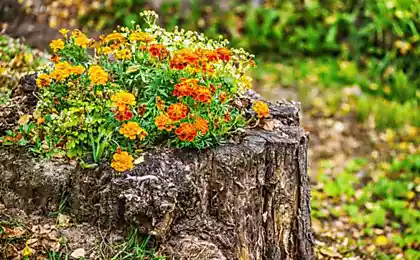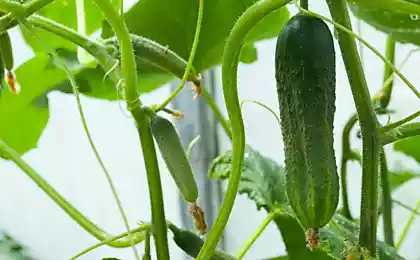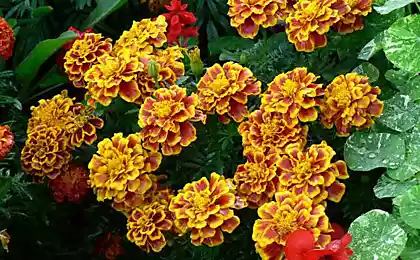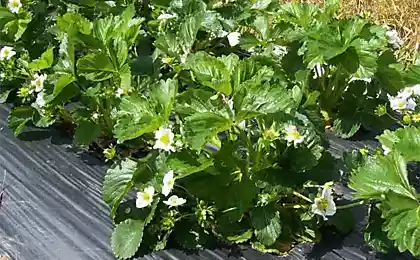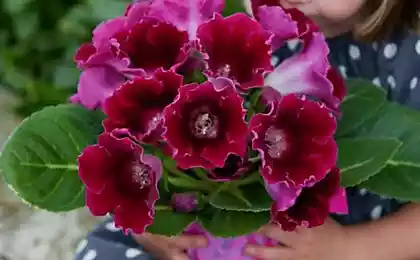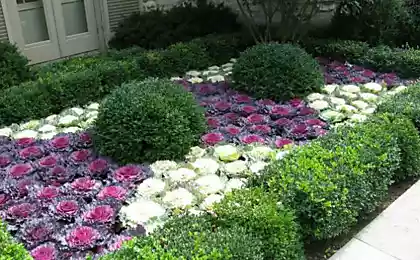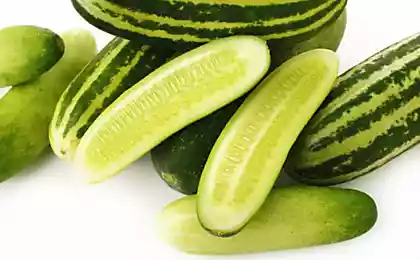484
10 important rules of growing roses
1. Any sort
To grow magnificent flowers, it is better to buy a modern domestic varieties. In its decorative qualities, they often surpass-selling Dutch and meet international standards. Have sturdy stems, a good styling of buds per spike, dense texture of petals, the beautiful ripple.
2. Landing
It is desirable to change annually. Or to grow gladioli in one place no more than 2-3 years. However, this plant loves light and does not tolerate cold and gusty winds.
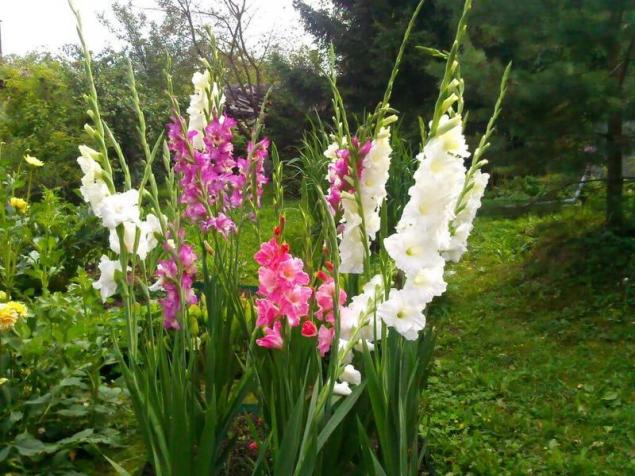
3. Soil
For gladioli will suit almost any soil. They are not too picky about it. But do not forget that the area with light soils need more to produce the glaze, and heavy tillage.
4. Treatment of bulbs
Before planting bulbs it is recommended to treat growth stimulants (Immunotsitofit, IAA, sodium HUMATE). And the newly acquired material no harm will be treated with Fundazol or Axiomata for the prevention of fungal and bacterial diseases.
5. Time of planting bulbs
The optimum time of planting of gladioli in the middle lane – 1-2-I decade of may (in southern areas). There is a General rule for all regions: need to plant the corms when the soil at a depth of 10 cm warms up to 10ºS.
Noted: when the leaves on the birch are the size of nickels – it's time to start planting. Adult bulbs approximate planting scheme is as follows: 15-20 cm in the row and 30-40 cm between rows, for children of 5-7 cm in the row and 15-20 cm between rows. Planting depth is usually three diameter of corms.
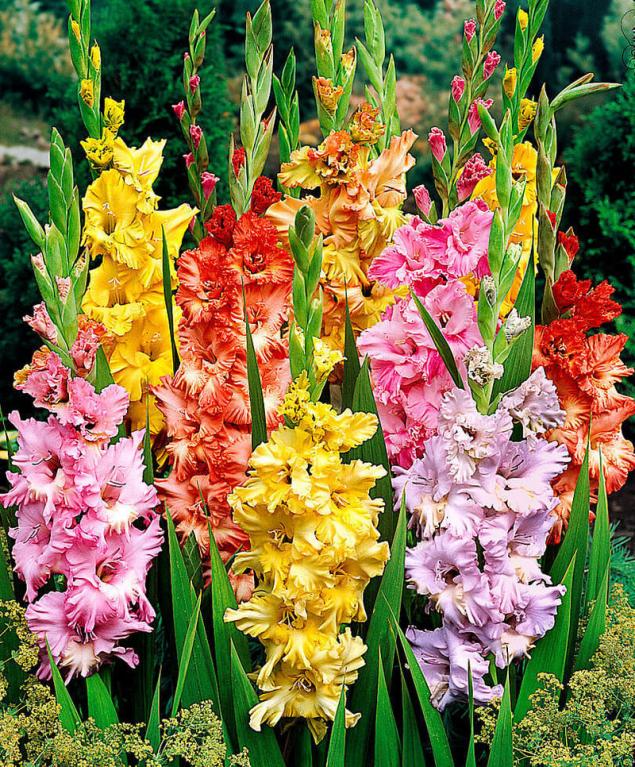
6. Feeding
In the fertile, annually udobrenij (humus, compost) the soil can do without fertilizing. But if the earth is poor, in June the gladioli is the most important to nitrogen and potassium, in July – nitrogen, potassium and phosphorus, and in August – only the potassium and phosphorus. Dosage – according to the instructions on the package.
Feeding should be fractional (in small portions), combining them with waterings. And remember that you cannot use fresh manure.
7. A competent watering
Water the plants copiously, but once in 5-10 days. It depends on the state of the soil, because the roots can go deep up to 40 cm
It's best to water gladioli in the evening with warm water. And keep in mind that adequate soil moisture is especially important, when a 3-4th sheet, as it is this time formed by the peduncle.
8. Control of pests and diseases
Preventive measures against major pests (aphids, caterpillars, thrips and spider mites) should be carried out 2-3 times over the summer any insecticide (Malathion, Actellic, Phytoverm, etc.). You can also use decoctions or infusions of tobacco, celandine, yarrow, but they are less effective, therefore the number of treatments will have to increase.
To protect from diseases 2-3 times per season gladioli should be treated with fungicides (Copper sulfate, Hom, Axioma). This is especially important in the rainy summer. And be sure to timely remove from the area diseased plants to infection has not migrated to healthy shoots.
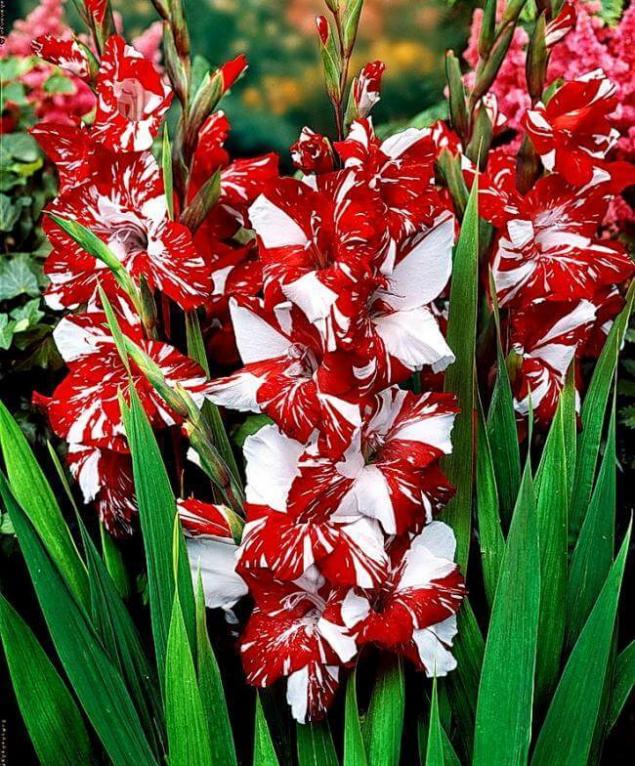
9. Digging bulbs
Do not be late with digging gladioli, especially if the autumn is cold and rainy. As a rule, the plants are ready for harvest 4-6 weeks after flowering, approximately mid-September. But even in the dry and warm autumn – not later than October 15.
After digging the plants you need to remove their stems and bulbs, rinse in running water using colander. Then put in a nylon pouch for mandatory treatment with insecticide and rinsed again in water.
Dry bulbs gladioli should be a week at a temperature of 25-28 ° C, and then 6-8 weeks at temperatures below 20 to 22 ° C. Remember: it is better to overdry than to necessity.
Also interesting: plants Change places, and you will not need to fertilize the soil
A very simple method of propagating violets — seven guys!
10. Storage of bulbs of gladioluses
The ideal temperature for storage is 4-6ºС at a humidity of 60-70%. Store onions in the cellar, the basement or the insulated balcony. In a city apartment you will have to find the most cool and definitely dry place, away from radiators. You can store and on the window sill, corms wrapped in several layers of paper, but not the glass.
Upon violation of a temperature mode in some varieties already in February, there are germs. 3-4 weeks before planting all the plants above 5 cm needs to be deleted. At the time of landing Wake up 1-2 dormant buds.published
Source: www.facebook.com/worldofplantsru/posts/1731910403738345:0
To grow magnificent flowers, it is better to buy a modern domestic varieties. In its decorative qualities, they often surpass-selling Dutch and meet international standards. Have sturdy stems, a good styling of buds per spike, dense texture of petals, the beautiful ripple.
2. Landing
It is desirable to change annually. Or to grow gladioli in one place no more than 2-3 years. However, this plant loves light and does not tolerate cold and gusty winds.

3. Soil
For gladioli will suit almost any soil. They are not too picky about it. But do not forget that the area with light soils need more to produce the glaze, and heavy tillage.
4. Treatment of bulbs
Before planting bulbs it is recommended to treat growth stimulants (Immunotsitofit, IAA, sodium HUMATE). And the newly acquired material no harm will be treated with Fundazol or Axiomata for the prevention of fungal and bacterial diseases.
5. Time of planting bulbs
The optimum time of planting of gladioli in the middle lane – 1-2-I decade of may (in southern areas). There is a General rule for all regions: need to plant the corms when the soil at a depth of 10 cm warms up to 10ºS.
Noted: when the leaves on the birch are the size of nickels – it's time to start planting. Adult bulbs approximate planting scheme is as follows: 15-20 cm in the row and 30-40 cm between rows, for children of 5-7 cm in the row and 15-20 cm between rows. Planting depth is usually three diameter of corms.

6. Feeding
In the fertile, annually udobrenij (humus, compost) the soil can do without fertilizing. But if the earth is poor, in June the gladioli is the most important to nitrogen and potassium, in July – nitrogen, potassium and phosphorus, and in August – only the potassium and phosphorus. Dosage – according to the instructions on the package.
Feeding should be fractional (in small portions), combining them with waterings. And remember that you cannot use fresh manure.
7. A competent watering
Water the plants copiously, but once in 5-10 days. It depends on the state of the soil, because the roots can go deep up to 40 cm
It's best to water gladioli in the evening with warm water. And keep in mind that adequate soil moisture is especially important, when a 3-4th sheet, as it is this time formed by the peduncle.
8. Control of pests and diseases
Preventive measures against major pests (aphids, caterpillars, thrips and spider mites) should be carried out 2-3 times over the summer any insecticide (Malathion, Actellic, Phytoverm, etc.). You can also use decoctions or infusions of tobacco, celandine, yarrow, but they are less effective, therefore the number of treatments will have to increase.
To protect from diseases 2-3 times per season gladioli should be treated with fungicides (Copper sulfate, Hom, Axioma). This is especially important in the rainy summer. And be sure to timely remove from the area diseased plants to infection has not migrated to healthy shoots.

9. Digging bulbs
Do not be late with digging gladioli, especially if the autumn is cold and rainy. As a rule, the plants are ready for harvest 4-6 weeks after flowering, approximately mid-September. But even in the dry and warm autumn – not later than October 15.
After digging the plants you need to remove their stems and bulbs, rinse in running water using colander. Then put in a nylon pouch for mandatory treatment with insecticide and rinsed again in water.
Dry bulbs gladioli should be a week at a temperature of 25-28 ° C, and then 6-8 weeks at temperatures below 20 to 22 ° C. Remember: it is better to overdry than to necessity.
Also interesting: plants Change places, and you will not need to fertilize the soil
A very simple method of propagating violets — seven guys!
10. Storage of bulbs of gladioluses
The ideal temperature for storage is 4-6ºС at a humidity of 60-70%. Store onions in the cellar, the basement or the insulated balcony. In a city apartment you will have to find the most cool and definitely dry place, away from radiators. You can store and on the window sill, corms wrapped in several layers of paper, but not the glass.
Upon violation of a temperature mode in some varieties already in February, there are germs. 3-4 weeks before planting all the plants above 5 cm needs to be deleted. At the time of landing Wake up 1-2 dormant buds.published
Source: www.facebook.com/worldofplantsru/posts/1731910403738345:0

